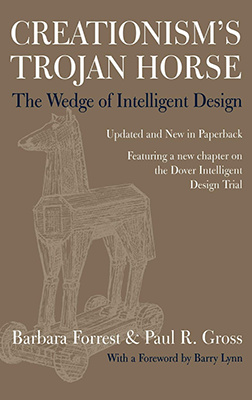Creationism’s Trojan Horse
“Creationism’s Trojan Horse: The Wedge of Intelligent Design” by Barbara Forrest and Paul R. Gross is a critical examination of the Intelligent Design (ID) movement, focusing on its origins, strategies, and implications. Here’s a summary of the key themes and arguments presented in the book:
Background on Intelligent Design: The book provides an overview of the Intelligent Design movement, which posits that certain features of the universe and living organisms are best explained by an intelligent cause rather than natural processes. Unlike traditional creationism, ID proponents often avoid explicitly religious language and claim their theory is scientific.
The Wedge Strategy: Forrest and Gross detail the “Wedge Strategy,” a document produced by the Discovery Institute, a key proponent of ID. The strategy outlines a plan to promote ID as a scientific alternative to evolution and to undermine the teaching of evolution in public schools. The authors argue that ID is essentially a rebranding of creationism aimed at circumventing legal challenges that prohibit teaching religious doctrines in public schools.
Critique of Scientific Validity: The authors critique the scientific validity of Intelligent Design, arguing that it lacks empirical evidence, does not provide testable hypotheses, and fails to meet the criteria for inclusion in science curricula. They emphasize that ID proponents exploit gaps in scientific knowledge and misrepresent evolutionary theory to advance their agenda.
Political and Legal Implications: “Creationism’s Trojan Horse” discusses the political and legal battles surrounding the teaching of evolution and Intelligent Design in public schools. The authors highlight court cases, such as the landmark Kitzmiller v. Dover Area School District case in 2005, where the teaching of ID was ruled unconstitutional due to its religious nature.
Philosophical and Religious Motivations: The book explores the philosophical and religious motivations behind the ID movement, arguing that its ultimate goal is to promote a specific religious worldview under the guise of scientific inquiry. Forrest and Gross contend that ID proponents aim to undermine the separation of church and state in education and public policy.
Impact and Response: “Creationism’s Trojan Horse” has been influential in shaping public understanding of the Intelligent Design movement and its implications for science education. It has been cited in legal proceedings and debates concerning the teaching of evolution and the promotion of religious doctrines in public schools.
Overall, “Creationism’s Trojan Horse” provides a critical analysis of the Intelligent Design movement, revealing its origins, strategies, and broader implications for science, education, and society.

